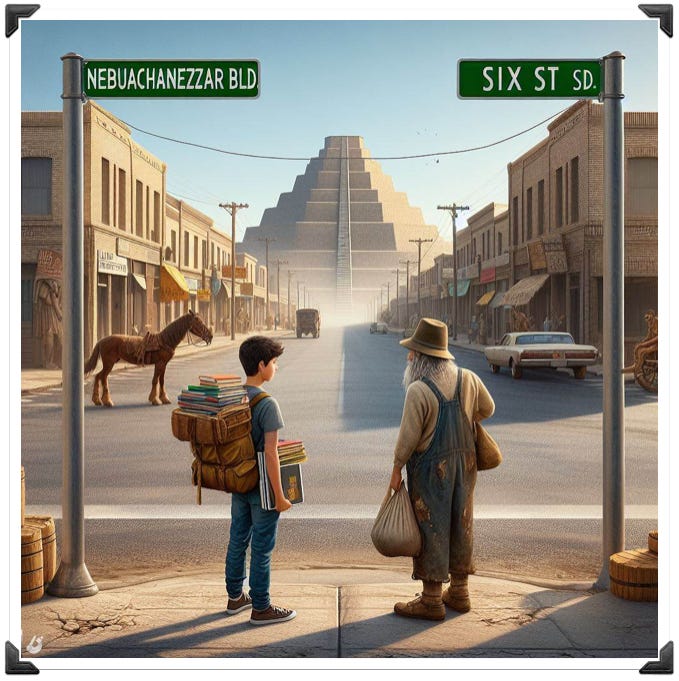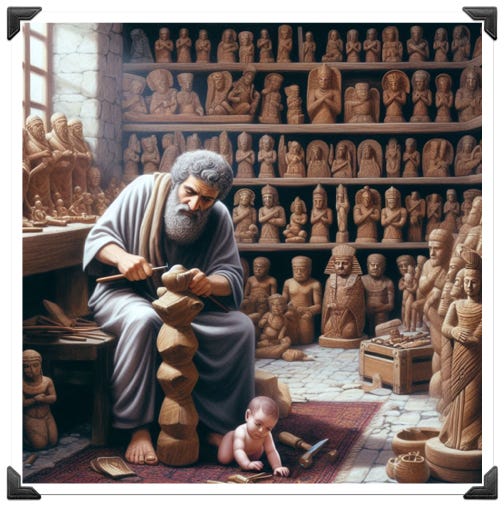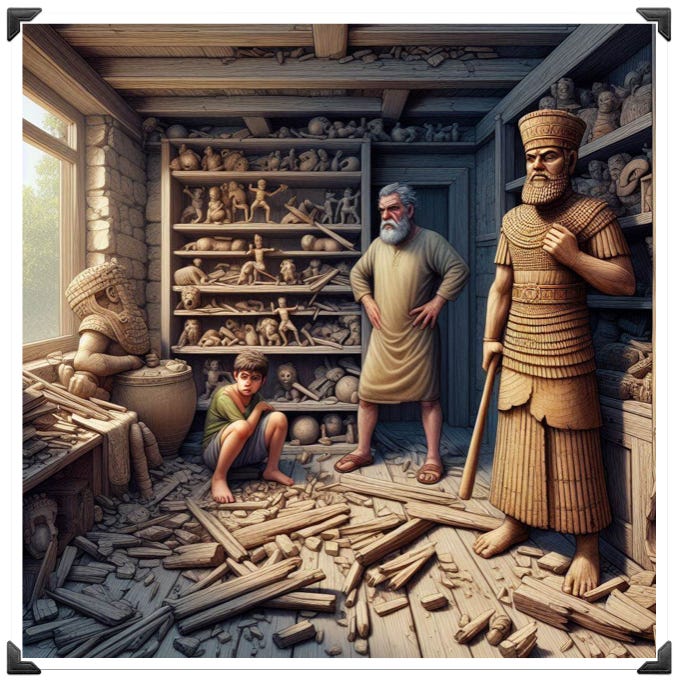Abraham: Our Exclusive Interview (Part II)
The father of ethical monotheism continues chatting with us — about loneliness, the challenge of changing hearts & minds, and the shattering confrontation with his Dad.

Patrick: Abe, it’s great to have you back for part two of our interview. [Part one is here.] I know you’re a busy guy, so I appreciate you making time.
Abe: My pleasure.
Teenage wasteland
Patrick: Let’s pick up where we left off. You said that when you were a teenager, you started feeling anxious and out of place…
Abe: Yes, indeed. It was a weird time. Everything in my life seemed in flux. But that feeling of change and dislocation — it’s true for all teenagers, don’t you think?
Patrick: Maybe. But in the world of teenagers, you, sir, were an outlier.
Abe: Nah, not really. Most teenagers with an ounce of self-awareness ask the same questions I did: Why am I here? Where am I going? What’s the meaning of my life? Why didn’t the Red Sox make any quality acquisitions in the off-season? … But kids quickly learn those questions lead nowhere, so they shut up and finish school and then take over Dad’s business or they learn a trade or, if they’re desperate, they go to law school. Me? I couldn’t do any of that.
Patrick: Why not?
Abe: Hmmm… I’m not sure. I had a lot of questions that I could never put to rest, and studying torts and contracts — no answers there. Problem is, the more I asked those big questions, the stranger things became for me.
Patrick: Strange how?
Abe: I told you about the old man who approached me on the street one day, out of the blue, right?

Patrick: Yes, you did.
Abe: Well, I could tell you other stories like that. Weird encounters. Bizarre moments. Unbelievable coincidences. Lots of situations when I felt the presence of something I couldn’t see or identify. A spirit, maybe. Or a disturbance in the time-space continuum. Or, if you believe in the Gospel of Obi-Wan Kenobi, The Force.
Patrick: “These aren’t the droids you are looking for!”
[Patrick laughs at his own Star Wars reference; Abe doesn’t.]
Abe: … Whatever you call it, I sensed that power or presence was not some still small voice within, but rather something inexpressibly big outside of me, beyond my body. Something out there. And it was… I dunno… staring at me? pushing me? waiting for me? beckoning?
“Go… to the land that I will show you…”
Patrick: So you were… “called”?
Abe: When you say it like that I sound crazy. Maybe less “called” and more drawn toward some thing or some place. Or, to quote Rabbi Joseph Soloveitchik: I felt “pulled, as by a magnet, towards a glorious destiny.”

Patrick: Towards your “glorious destiny”?? Please don’t take offense, Abe, but you sound narcissistic. Grandiose. As if you think the whole world revolves around you.
Abe: Yeah, I know. A messiah complex, right? But in my defense: Seek and you shall find.
Patriarch and pariah
Patrick: How did your parents react to you being a “man on a mission”?
Abe: Mom didn’t have much patience for it. She always said to me, “You want to ‘find yourself’? Look in a mirror!”
Patrick: Oof! That’s harsh.
Abe: No, not really. I think Mom was trying to keep me out of trouble. She knew that asking too many sensitive questions in public could create problems for our family — and for me.
Patrick: Did it?

Abe: It sure did. My classmates thought I was a fool. A joke. A weirdo and a troublemaker. People either laughed at me, or were deeply insulted. Or both.
Patrick: Insulted by what?
Abe: They were insulted because I challenged their worldview. We don’t have to accept the status quo. We don’t have to bow down to King Nebuchadnezzar or suck up to his family and those close to power because we’re all created in the image of G*d. We don’t have to worship trees or the sun or entertainers or supermodels or whatever society’s Golden Calf happens to be at the moment. We can do better. Live better. Treat each other better. We can embrace the widow, the orphan, and the stranger. … Today we call this “progress,” and we assume it’s a force that’s as natural as gravity. But it’s not and never has been. Progress — our collective journey through history toward a better world, a Promised Land — is frequently interrupted by unexpected detours, dangers, and demagogues.

Patrick: So people thought you were crazy…
Abe: Crazy AND a snob. An elitist.
Patrick: Why an elitist?
Abe: They thought I was making a judgment — a negative one— about their lives and their parents’ lives, and about everyone else in our community. By embracing a radically new way of thinking and living, I was effectively saying the old way wasn’t as good — or at least not good enough for me and my family. People found that attitude snotty, haughty, and holier-than-thou. They still do. You might even say this tension is the root cause of anti-Semitism.
Patrick: So why not just stop with the G*d stuff and assimilate?
Abe: You think I should turn a blind eye to the ignorance, poverty, injustice, inhumanity, and abuse of power we see all around us? See something, say nothing?? Is that the best we can do?
Patrick: Probably not. … Did you try to explain yourself to your antagonists? Maybe if they understood your vision, they might choose to join you on your quest for a better world.
Abe: Ah, yes. Dialogue. Debate. Join the conversation!
[Abe laughs]
Patrick: What’s so funny?
Abe: You seem to believe that most people, when presented with new facts and information, will change their minds. But they don’t. They just double down on whatever they already believe. Staying in Ur and working for change from within would have been a fool’s errand.
Patrick: Is that why you eventually left home?
Abe: Mostly, yes. I figured my mission was to walk this new walk. Show, don’t tell. Be the change I want to see in the world. And I couldn’t do that in the heart of Mesopotamia.
Patrick: Were there any other reasons you left home?
Abe: Yeah, but I’m rather embarrassed by them.
Patrick: Abe. Buddy. Pal. Amigo. This is a safe space, my friend. We’re here to explore and learn, not judge, especially in front of millions of TV viewers. But after the show, we shall mock you relentlessly for your naive idealism and childish dreams!
[Abe and Patrick have a good laugh.]
“Not my proudest moment…”
Abe: Okay… this is embarrassing, but here’s what happened:
I was about 17 years old, and still living in Ur with my parents. As I mentioned in our previous interview, my Dad was an idol maker. Terah’s Top Quality Idols. That was the name of his shop. Or as Dad liked to say to his customers: The Best Gods At The Lowest Prices — Guaranteed!
I’d just finished my junior year in high school, and it was summer vacation. A weekday in July, I think. I was at the shop helping out my Dad, but I was becoming increasingly frustrated that no one understood my insight that the gods we all had been worshipping for centuries were false gods. They were just figurines made from wood and clay that had no power. None at all. Yet they stood at the center of our lives.
Patrick: And you wanted your Dad to understand that — and your new vision of progress and hope.
Abe: Yes, that’s right. So one day around noon, my Dad has to leave the shop for a meeting downtown, and he puts me in charge of the store. A few minutes later, a guy walks in to buy an idol. I ask him how old he is, and the guy says he’s 60. And I say to him, “You’re 60 and you’d worship a statue I made in the back room two days ago?!?” The guy gets red in the face and leaves.
Patrick: Then what?
Abe: About ten minutes later, a woman walks into the store and tells me she wants to make a food offering to one of the idols. I think this is crazy, just totally bonkers, and I snap. I grab a big wooden club off Dad’s workbench and smash all the idols to bits. The woman freaks out and runs away. Then I look around, horrified at what I’d just done. Wood and clay shards are everywhere. Not a single idol is still intact, except one — the largest idol in our inventory. Brutus, I call him. Suddenly, I have what seems like a brilliant idea: I place my wooden club in Brutus’s right hand.
When my Dad returns, he’s furious. “What the hell happened here??” he screams at me. I tell him a woman came to make a food offering to the idols, but the idols argued about which one should eat the offering first — and a fight broke out. Brutus had a huge size advantage and a wooden club, so he smashed all the other idols to pieces.
Dad’s eyes go dark, and he stares straight at me. “That’s impossible!” he says. “These idols are made of wood and clay. They don’t eat. They can’t talk or move. They have no knowledge and no power.”
And then — and I realize now what a mistake this was — I laugh long and hard at my father. “You admit these idols have no knowledge, wisdom, or power,” I say to him triumphantly. “Yet you worship them! Dad!! Can’t you see how crazy this is?!?”
Patrick: Oooohhhh boy. You clearly have never read How To Win Friends And Influence People. What did your Dad say?
Abe: Oh my G*d. He was apoplectic. Total rage. I’d never seen him so angry. It was frightening. I could barely…
Patrick: Abe, I’m heartbroken to do this after such an illuminating story, but I’m afraid we’re out of time.
Abe: How can you be out of time when the only…
Patrick [facing camera]: Coming up next on O’Goldstein Tonight — scrumptious new potato salad recipes for your summer bar-b-q! After the break!





